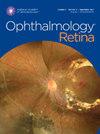Retinal Fluid and Thickness Fluctuations in Archway Trial for Port Delivery System with Ranibizumab versus Monthly Ranibizumab Injections
IF 4.4
Q1 OPHTHALMOLOGY
引用次数: 0
Abstract
Purpose
To determine proportion of eyes with neovascular age-related macular degeneration (nAMD) with retinal fluid and central subfield thickness (CST) fluctuations and evaluate their impact on best-corrected visual acuity (BCVA) in eyes treated with the Port Delivery System with ranibizumab (PDS) versus monthly intravitreal ranibizumab injections.
Design
Post hoc analyses of phase 3 Archway trial (NCT03677934).
Participants
Adults with nAMD responsive to anti-VEGF therapy.
Intervention
Four hundred eighteen patients randomized 3:2 to the PDS (100 mg/mL) with refill-exchanges every 24 weeks (Q24W) or monthly intravitreal ranibizumab (0.5 mg) for 96 weeks.
Outcomes
Proportion of eyes in each treatment arm with subretinal and/or intraretinal fluid (SRF/IRF) overall and in central 1 mm; BCVA changes from baseline by treatment arm and fluid presence/location; proportion of eyes with CST fluctuations from baseline to week 48, week 48 to 96, and baseline to week 96; effects of CST fluctuations on BCVA.
Results
Four hundred fifteen eyes were assessed. In the PDS versus monthly ranibizumab arm, proportion of eyes with SRF/IRF, central SRF, and central IRF were 47.6% versus 50.9%, 29.0% versus 19.2%, and 11.7% versus 12.6% at baseline, and 57.8% versus 56.1%, 21.6% versus 14.8%, and 7.0% versus 8.4% at week 96, respectively. BCVA changes from baseline to week 96 were −1.1 letters with the PDS versus −1.4 with monthly ranibizumab in eyes with SRF/IRF, and −1.9 versus −1.8 in eyes with central SRF. In eyes with central IRF, BCVA changes from baseline to week 96 were −2.1 with the PDS versus −6.9 with monthly ranibizumab, respectively (mean BCVA at 96 weeks 68.9 [20/40] vs. 64.6 [20/50]). CST fluctuations occurred in 32.1% and 29.7% of PDS versus monthly ranibizumab eyes; corresponding BCVA changes from baseline to week 96 were −2.5 versus −2.6 (mean BCVA at 96 weeks 72.7 [20/35] vs. 71.5 [20/38]).
Conclusions
Port Delivery System with ranibizumab Q24W maintained BCVA to 96 weeks regardless of SRF/IRF, central SRF, central IRF, or CST fluctuations, comparable with monthly ranibizumab, thus supporting the use of the PDS in stabilizing retinal anatomy without the need for monthly treatment in patients with nAMD.
Financial Disclosure(s)
Proprietary or commercial disclosure may be found in the Footnotes and Disclosures at the end of this article.
使用拉尼珠单抗的端口给药系统与每月注射拉尼珠单抗的 Archway 试验中的视网膜液和厚度波动。
目的:确定新生血管性年龄相关性黄斑变性(nAMD)患者视网膜积液和/或中央子野厚度(CST)波动的比例,并评估其对最佳矫正视力(BCVA)的影响:设计:Archway 3 期试验(NCT03677934)的事后分析:对抗血管内皮生长因子治疗有反应的成人nAMD患者:418名患者按3:2随机分配至PDS(100毫克/毫升),每24周更换一次填充剂(Q24W)或每月一次静脉注射雷尼珠单抗(0.5毫克),共96周:结果:每个治疗组中总体和中央 1 mm 处有视网膜下和/或视网膜内积液(SRF/IRF)的眼球比例;按治疗组和积液存在/位置分列的 BCVA 与基线相比的变化;基线至第 48 周、第 48 周至第 96 周和基线至第 96 周 CST 波动的眼球比例;CST 波动对 BCVA 的影响:共评估了 415 只眼睛。在PDS与每月一次的雷尼珠单抗治疗组中,基线时SRF/IRF、中心SRF和中心IRF的眼睛比例分别为47.6%对50.9%、29.0%对19.2%和11.7%对12.6%,第96周时分别为57.8%对56.1%、21.6%对14.8%和7.0%对8.4%。SRF/IRF患者的BCVA从基线到第96周的变化为:使用PDS为-1.1个字母,而每月使用雷尼珠单抗为-1.4个字母;中心性SRF患者的BCVA从基线到第96周的变化为-1.9个字母,而每月使用雷尼珠单抗为-1.8个字母。在中央 IRF 患者中,从基线到第 96 周,PDS 的 BCVA 变化为-2.1,而每月使用雷尼单抗的 BCVA 变化为-6.9(96 周时的平均 BCVA 为 68.9 [20/40] 对 64.6 [20/50])。32.1%的PDS眼和29.7%的雷尼单抗月经眼出现CST波动;从基线到第96周的相应BCVA变化分别为-2.5和-2.6(96周时的平均BCVA为72.7 [20/35] 和71.5 [20/38]):结论:无论SRF/IRF、中心SRF、中心IRF或CST的波动如何,PDS Q24W都能将BCVA维持到96周,与每月一次的雷尼珠单抗相当,因此支持使用PDS稳定nAMD患者的视网膜解剖结构,而无需每月一次的治疗。
本文章由计算机程序翻译,如有差异,请以英文原文为准。
求助全文
约1分钟内获得全文
求助全文

 求助内容:
求助内容: 应助结果提醒方式:
应助结果提醒方式:


